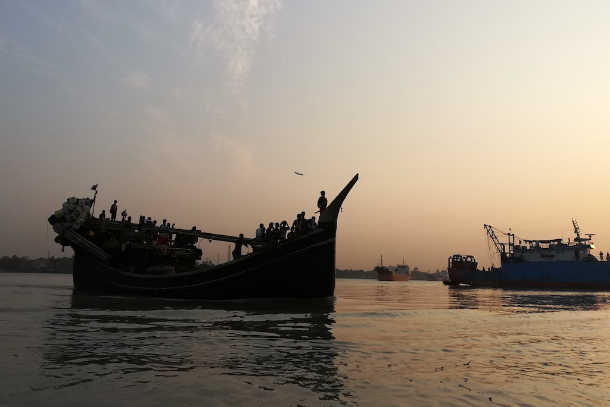
A fishing boat departs from New Bridge near Chittagong in Bangladesh to head into the Bay of Bengal on Feb. 9. More than 170,000 people boarded boats from Myanmar and Bangladesh to Malaysia and Thailand from 2012-15, a new report says. Many fell victim to crimes by human traffickers. (Photo by Stephan Uttom/ucanews.com)
A transnational human trafficking syndicate committed crimes against humanity in Malaysia and Thailand against tens of thousands of Rohingya and Bangladeshi men, women and children, according to a new rights report.
“Sold Like Fish” is a 121-page report jointly produced by the Human Rights Commission of Malaysia and Fortify Rights, a group covering Southeast Asia.
The report, released on March 27, is based on a joint investigation including more than 270 interviews with eyewitnesses, survivors, human traffickers, government officials and others from 2013-19. The abuses happened from 2012-15.
It documents traffickers’ crimes against Rohingya and Bangladeshis including murder, rape, torture and depriving victims of adequate food, water and space. Many captives died by suicide at sea.
In camps at Wang Kelian on the Thai-Malay border, traffickers denied their captives access to adequate food, water and space, resulting in deaths, illness and injury, including paralysis, particularly for those without money.
“When I was unable to pay money to the men, they poured boiling water on my head and body,” said Rahim Ullah, a Rohingya Muslim who was 16 when traffickers tortured him in a camp at Wang Kelian in 2014.
More than 170,000 people, mostly Rohingya Muslims, boarded boats bound for Malaysia and Thailand from Myanmar and Bangladesh. However, in late 2014 and 2015, traffickers began to target Bangladeshi nationals as well, the report said.
Rohingya trafficking trade generated about US$50-100 million per year from 2012-15, the report estimated.
“The massive scale and horrific severity of these operations were never properly documented or fully prosecuted. This new evidence demonstrates the need for accountability,” said Matthew Smith, chief executive of Fortify Rights.
Although human trafficking has relatively slowed since the 2015 Asian boat people crisis and an anti-trafficking crackdown, Rohingya and Bangladeshi people remain vulnerable to the crime, officials and activists say.
“Due to a heavy crackdown since 2015, we have seen a slumber in trafficking, but given that it is a lucrative business, poor and helpless people like Rohingya are always vulnerable to trafficking,” Muhammad Nikaruzzaman, chief government officer at Ukhiya in Bangladesh’s Cox’s Bazar district, told ucanews.com.
Cox’s Bazar is home to more than one million Rohingya Muslims who fled various bouts of persecution in Myanmar including deadly military crackdowns in 2016 and 2017.
Poor people, especially Rohingya refugees, remain even more vulnerable to trafficking today, said James Gomes, regional director of Catholic charity Caritas Chittagong.
“During 2012-15, the condition of Rohingya was relatively better than it is now, yet so many became victims of trafficking. In recent months, law enforcers have nabbed traffickers’ boats and rescued potential victims, which means traffickers are still preying on poor and helpless Rohingya as well as Bangladeshis,” Gomes told ucanews.com.
“The report is a warning for governments, aid agencies and anti-trafficking groups, and a collective, effective and coordinated effort is required to tackle the threat of trafficking.”
Abu Morshed Chowdhury, an anti-trafficking campaigner in Cox’s Bazar, had similar concerns.
“The trafficking network was broken by the crackdowns but didn’t die out. Recent interceptions of traffickers’ boats show the criminals are trying to revive the network. There are people among Rohingya and Bangladeshis who want to go abroad to change their fortune, which is major cause of concern,” Chowdhury told ucanews.com.
“In order to tackle trafficking, governments in the region need to collaborate better with aid groups and anti-trafficking campaigners.”


